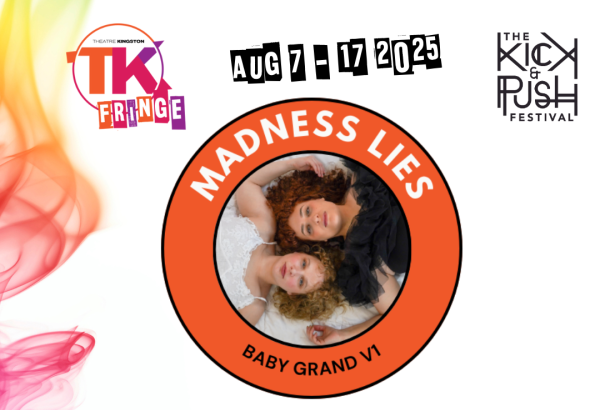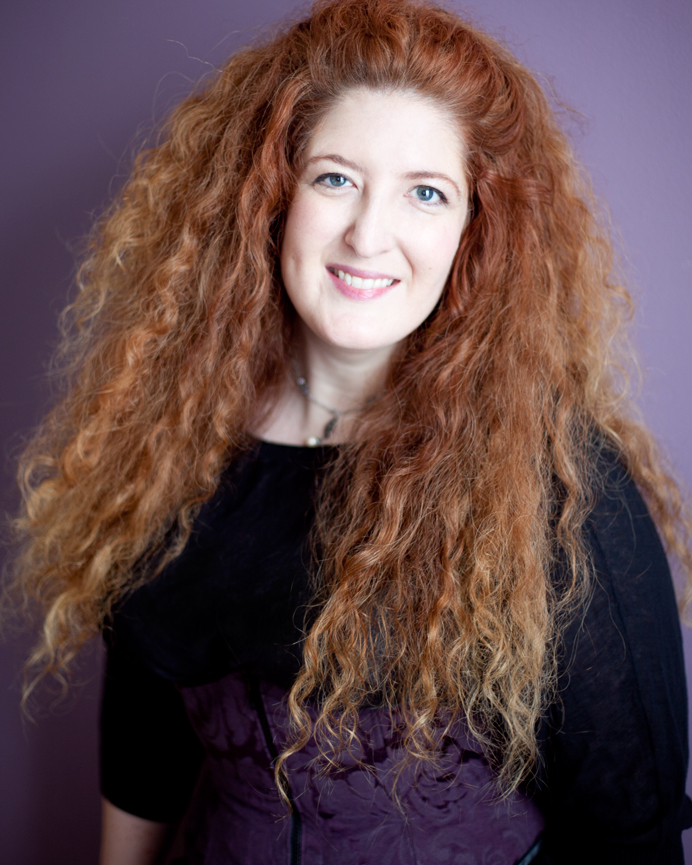‘Madness Lies’ Reconsiders Wild and Whirling Words

For me, one of the main draws to theatre is how we frequently come back to the same stories over and over again. Whether that be through a new production of an old script, or reimagining the same story anew, the past is always on stage to comment on the present. Chloë Whitehorn is one of Kington’s more prolific playwrights, and for this year’s Kingston Fringe Festival she is producing the world premiere of Madness Lies through her company, Mad River Theatre. The company’s website describes the show as “Hamlet meets Girl, Interrupted,” and this is hardly Whitehorn’s first venture into the world of adaptation. I had the chance to chat with Whitehorn about this new show and the process that goes into creating an adaptation for a Fringe Festival.
This interview has been edited for length and clarity.

Finding inspiration in older texts is nothing new to Whitehorn, who has previously written plays based on a variety of mythologies and classics, including Oedipus Rex, Romeo and Juliet, and even the concept of Charon and the River Styx. “I found it easier than starting from scratch – and most of my stuff I have just started from scratch,” she notes on the process before sharing her personal history with adaptation, beginning with Verona Heights, her reimagining of Romeo and Juliet. “I had a teacher at a high school – they were tired of doing Shakespeare but still had to teach it — they asked me to do an adaptation of [one of Shakespeare’s plays].” Following Verona Heights’ premiere in 2012, it was not long before she was eying her next classic to reimagine: “I got a grant in Toronto to write Divine Wrecks, which is my adaptation of Oedipus Rex set in a high school. I felt like a Greek Chorus talking about things that the audience is seeing, and having their own opinions is like teenagers in high school gossiping about stuff.”
More recently in 2024’s TK Fringe, Mad River Theatre produced another play inspired by Shakespeare: The Fall After Midsummer, a modern twist on A Midsummer Night’s Dream. It has since played at this summer’s Domino One-Act Play Festival where it won Best Production, was awarded a Best Coordinated Production certificate, and will be remounted once again in November at the Eastern Ontario Drama League One-Act Festival in Merrickville. The desire to create another play inspired by Shakespeare began with this show’s success: “I wanted originally to pair something with The Fall After Midsummer, because as a one-act I can’t really do much with it unless I have another one act; then you can do a night of theatre.” Whitehorn describes the beginning of this process with, “I was thinking about other Shakespearian characters that irked me, and I landed on Hamlet.”
Once the source material was determined, her next step came in considering how the story might be different if Hamlet were a woman: “I started wanting to write on something that touched on mental illness, and remove some of the stigma from around the topic.” Then, she began researching past articles on women’s mental health treatments, which opened up a dark history: “All it took in the Victorian Era was a husband or a father to say a woman was crazy, and she was institutionalized.” As she continued researching different instances and cases, she eventually reached more recent issues: “In the 50s, the pharmaceutical companies got involved. So women who weren’t happy molding themselves into that perfect Donna-Reed-Mother-Wife figure, they were medicated.”
This research completed the second step of her process. Now that she had a source material and a topic, her final step came in finding who would help her bring this to life, “I was fortunate enough to have two incredibly talented actors [Shannon Donnely and Jennifer Verardi] agree to sign onto the project without having read a single word of the play. Then, knowing who I was writing for, I took all of that, put it in a teapot, stewed it up, and poured myself a play.”
Finding close collaborators is not only a vital step in Whitehorn’s playwriting process, but being the director for the premiere production as well, she has to find people who she can work with for the long rehearsal process leading up to the festival. “I didn’t use to direct my own [plays],” she explained, “I had only ever directed a production of Never Swim Alone at the Domino One Act Festival, a long time ago. That was the only time I had directed until last year when I directed The Fall After Midsummer.” A playwright tackling the direction of their premiere production is a relatively common combination for many artists, “I’ve found, as a playwright, I’m usually out of the rehearsal room a lot. It’s not as collaborative an experience as when I was an actor and working in the shows, so this has been nice to see the whole [process] all the way through.”
When we ended our conversation, Whitehorn made clear the value of Fringe Festivals as an affordable platform to produce these new works. The shows selected in each festival are drawn at random after artists pay a small submission fee; then once names are drawn, the selected artists pay a small entry fee to cover all venue and staffing costs. When the festival begins, the artists receive the majority of funds from ticket sales (with pennies going to Theatre Kingston, and a few dollars going to the Grand Theatre as an admin fee). Because of this system, most Fringe shows operate on a profit-share model where all of the profits are divided amongst everyone who worked on the show; often leaving very little to pay the artists for their time. Whitehorn and her team of two performers make up the production’s entire staff, with everyone sharing the load of the many aspects required of making a show. The small team size is no accident, “I like to pay my actors, and when you have seven people on stage you’re not gonna end up paying them anything.”
Whitehorn is seasoned as both a playwright and a Fringe artist, so Madness Lies is without a doubt one of the scripts to keep an eye on in the upcoming festival. Her commitment to paying her artists is a definite plus, as you know exactly where your ticket money will be going when you make the purchase. If none of those reasons are convincing enough to go see the show, I personally know I’ll be in the audience curious to see a new reflection on an old story.
Chloë’s work often challenges societal preconceptions and examines the broken bits of ourselves we all try to hide while injecting humour into difficult topics. A graduate of Queen’s University’s theatre program, her plays have been performed across Canada, the United States, and the United Kingdom, and published in various collections. IG: @madrivertheatre
‘Madness Lies’ produced by Mad River Theatre will be presented by TK Fringe as part of The Kick & Push Festival from August 8 to 17, 2025. More information about the Fringe can be found here, and tickets to ‘Madness Lies’ can be found here.
